Registered delegates can login to the conference mobile app here to bookmark and RSVP favourite sessions and sync them their phone.
Fireside Chat: Collective Action for Gender Equity
This conversation will outline the urgency of centering gender equity in the world's response to emerging health threats, and – drawing on rich experiences and insight – what it will take to incite collective action to finally elevate women leaders for the benefit of all humanity.
Speaker:
1. Dr. Jakaya Mrisho Kikwete, Former President of the United Republic of Tanzania
2. The Rt. Hon Helen Clark, Former Prime Minister, New Zealand
Moderator: Dr. Adanna Chukwuma, Senior Director, Visa Inc.
Spoken Word
Writer and poet Hellen Bulugu will perform an original poem reflecting on the strength, resilience and collective power of women, and inspiring participants to envision new possibilities for women’s leadership.
Speaker: Hellen Bulugu, Writer, Poet
Leaders Panel: Transformative Leadership in a Rapidly Evolving World
Now more than ever, the world needs visionary and transformative leaders to help navigate uncharted and complex territories. Often, this means leaders who are willing to question established norms around leadership and do things differently. Parity between men and women in leadership is one critical but insufficient step toward this goal; equally important is examining the nature of effective leadership itself, including how historic ideas around leadership interact with gender norms and expectations. This panel will explore what redefining leadership looks like in action in the health space and beyond, how to cultivate qualities needed, and how new approaches are vital to driving lasting change in organizations and society.
Video Address: Dr. Sania Nishtar, CEO of Gavi, the Vaccine Alliance
Moderator: Ms. Sia Nowrojee, Senior Director, Girls & Women Strategy, UN Foundation
Speakers:
1. Dr Anita Zaidi, President, Gender Equality, Bill & Melinda Gates Foundation
2. Mary Rusimbi, Board Member & Founder Women Fund Tanzania Trust
3. Dr. Michael Adekunle Charles, CEO, Roll Back Malaria
4. Dr Shekalaghe Seif, Permanent Sectretary, Ministry of Gender- Tanzania
Spotlight Talk: Women’s Leadership and SRHR
The right to sexual and reproductive health (SRHR) is essential to women’s empowerment, gender equality, and sustainable development. Delivered by Idyoro Ojukwu, a leader on SRHR and the first female Obstetrician and Gynaecologist in South Sudan, this Spotlight Talk will focus on her own journey and the power of women’s leadership in driving progress on sexual and reproductive health.
Speaker: Dr. Idyoro Ojukwu, Obstetrician & Gynaecological Oncologist, Mater Misercordia Hospital
Transforming Health Leadership Through Mid-Level Providers: RHNK’s Model in Kenya
Led by: Reproductive Health Network Kenya
For gender transformative leadership by health leaders to be realized, all leaders in health must be intentional in nurturing diverse leadership and promoting gender transformative policies as a basis to strengthen the health system. This session seeks to highlight the significant contribution of mid-level providers, particularly women, in health systems. The session will also provide insights into the challenges faced by women mid-level providers in attaining leadership roles in the health sector.
Speakers:
1. Dr Edison Omollo, Program Director, Reproductive Health Network Kenya
2. Nelly Munyasia, Executive Director, Reproductive Health Network Kenya
3. Ms. Beverlyn Polet, Reproductive Health Network kenya
4. Prof. Anne Kihara, President, FIGO
5. Ms. Evelyne Opondo Africa Director, International Center for Research on Women(ICRW)
Championing Youth Leadership in the SRHR/Family Planning Sector: Lessons from FP2030
Led by FP2030.
The sexual and reproductive health needs of adolescents and youth must be met to achieve the Sustainable Development Goals (SDGs). Within the 10-29 demographic, there are SRH challenges faced by youth of all genders, but adolescent girls bear unique needs, aspirations, and compounding challenges. Focusing on adolescents and youth increases sustainability, has a three-generation impact, and decreases the need for future social behavior change interventions as their behaviors are shaped during adolescence. FP2030, a global partnership centered solely on family planning works with youth leaders and advocates as part of its group of technical leaders who oversee the country’s FP2030 commitment to family planning. This session’s focus aligns with the third conference theme: Advancing Women’s Leadership in Health. Specifically, the discussion will focus on best practices for promoting future women’s and youth leadership as a critical path to the success of the FP2030 partnership and building its legacy and future leaders in FP service delivery, policy advocacy, and research.
Opening Remarks: Dr Samukeliso Dube, Executive Director, FP2030
Moderator: Dr Sheila Macharia, Managing Director FP2030 ESA Hub
Speakers:
1. Ms. Shalom Mwape, Youth leader Zambia
2. Ms. Ninabina Davie Kitururu, Youth leader Tanzania
3. Ms. Sesilia Shirima, CSO/YLO
Women in Global Health: Defying Backlash and Cultivating Leadership for Gender-Responsive Health Systems
Led by: Women in Global Health.
Women in Global Health (WGH) was the first organization to campaign for gender equality in health leadership. Since launching its movement in 2015, its global advocacy is supported today by 57 country chapters across 51 countries. Collectively they have garnered considerable political awareness and momentum towards advancing gender equity in women’s leadership through gender transformative leadership.
UHC is expected to be a game changer for women’s health rights but the progress in many countries is threatened by a growing global backlash against the rights of women and girls and against wider gender equality Gender-responsive health policies and plans can address the gendered health inequities ensuring that they are tailored to the needs of a diverse population. However, this is possible only if there is an inclusive engagement and effective participation of women in policy and decision-making processes in the health sector as it allows for harnessing the diverse perspectives, expertise and lived experiences. Women’s work – paid and unpaid – forms the essential foundation for health, well-being, and delivery of health systems. Despite constituting 70% of the overall global healthcare workforce, women are vastly underrepresented i.e. only 25% in top leadership positions.
The panel moderated by Dr Shabnum Sarfraz, Deputy Executive Director WGH will bring together a dynamic group of women leaders from Nigeria, Kenya, India, Zimbabwe and US Country Chapters. They will together examine gendered health inequalities; explore the impact of escalating anti-rights backlash against women’s rights; navigate the role of women health workers amidst the evolving health landscape; outline why women’s leadership is critical to establishing gender-responsive health systems and towards achieving Universal Health Coverage (UHC); identify the barriers and enablers to women’s advancement in the health sector and highlight the policy initiatives needed to promote gender equity in health leadership.
Moderator: Dr. Shabnum Sarfraz, Global Director, Gender and Health/ Deputy Executive Director, Women in Global Health
Panelists:
1. Ms. Lanice Williams, Independent Consultant, Chair, Women in Global Health Washington, DC Chapter
2. Dr. Choolwe Jacobs WGH Zambia
3. Sapna Kedia, WGH India
4. Ruth Ngechu, WGH Kenya
5. Prof Rhoda Wanyenze, WGH Uganda
Driving Ethics & Equity through Digital Innovations: The future of Al in Global Health
Led by: WomenLift Health.
Digital innovations such as AI are rapidly evolving to become crucial components of our everyday lives: from basic technology to revolutionizing primary care, the applications of AI are widespread. This session will feature accomplished leaders and experts who are driving equitable and ethical innovation and supporting the next generation of digital health and AI leadership. Together, participants will explore steps we can take to build equity and inclusivity into tools, including by diversifying women leadership in the field.
Moderator: Joy Kamunyori, Senior Health Information Systems Advisor, USAID
Speakers:
1. Dr Muthoni Ntonjira, Managing Director and Health Systems District Leader, Philips East Africa
2. Dr Olivia Velez, Director of Technical Services, Center of Digital and Data Excellence, PATH
3. Fraiser Kilonzo, Cyber Security Engineering Lead, Cyber Guard Africa
4. Caroline Mbindyo, CEO, Amref Health Innovations
African Women Rising: Investing in Women as Global Health Leaders for Sustainable Development
Led by: WomenLift Health.
Like in many other regions around the world, African women are at the forefront of healthcare delivery across the continent, providing both paid and unpaid labor where it is needed most. Yet their leadership potential remains largely untapped, with African women making up just a fraction of the 5% representation of women from low- and middle-income countries at the helm of global health organizations. This session will bring together a diverse selection of progressive African professionals to explore the critical need for investing in African women's leadership in global health. Panelists will unpack the realities of African women’s participation in health, share their own experiences, highlight the impacts of empowering women as decision-makers, and outline strategies to accelerate investment in African women as global health leaders for sustainable development.
Moderator: Akhona Tshangale, Southern Africa Director, WomenLift Health
Speakers:
1. Dr. Norah Obudho, East Africa Director, WomenLift Health
2. Ms. Abosede George-Ogan, Founder, Women in Leadership Advancement Network (WILAN)
3. Awa Sarr, Program Director, EtriLabs
4. Oley Dibba-Wadda ,Executive Director, The Ellen Johnson Sirleaf Presidential Center for Women and Development
5. Klara Michal, Chief Learning Officer, AMP HEALTH
[Workshop] The Critical Role of Emotional Intelligence in Leading Change
Led by: WomenLift Health Alumnae.
Emotional Intelligence is no longer a soft skill. Instead, it is a power-skill for resilient leadership and impactful change. In the face of a rapidly evolving world, characterized by volatility, uncertainty, complexity, and ambiguity (VUCA), the demand for transformational leadership in global health has never been more urgent. This is a comprehensive 90-minute workshop designed to equip current and aspiring leaders with awareness on emotional intelligence (EI) skills necessary to navigate this complexity, with agility and impact.
This session delves deep into the transformative power of EI in leading change and shaping a culture of personal and organizational resilience. With the increasing prevalence of technological shifts and a rising epidemic of burnout, there is a clear need for leaders to not only understand and manage their own emotions, but also positively influence the emotional climate of their teams and organizations. EI emerges as a cornerstone for leaders to effectively sponsor the people-side of change, enabling them to communicate effectively, manage stress and uncertainty, foster adaptability, and lead with empathy.
Featuring insights from Dr. Aparna Arvind and Dr. Kashmira Date, experts in the field of leadership development and global health respectively, the 90-min workshop will explore the science of EI, its intersection with change adoption, and practical tips to apply insight. Through a blend of mini-lectures, real-life anecdotes, and interactive practical exercises using concepts from Positive Intelligence ® and Genos Emotional Intelligence ®, attendees will gain invaluable insights into enhancing their EI capabilities. The workshop is structured to provide actionable strategies for developing and applying EI, emphasizing empathy, emotional awareness, and regulation as pathways to driving greater connectedness and shaping resilience within teams/organizations. Change starts from a place of awareness, and this workshop intends to enrich participants with the tools to help take proactive steps in shifting their leadership narrative.
Quiet Quicksand: Caregiving as a key Determinant to Gender Equal Leadership
Led by: WomenLift Health Alumnae.
While the detriments of dependent and/or elder caregiving are increasingly being documented, including diminished mental and physical health, financial security, career prospects, and overall well-being, the complex dynamics of those outcomes are not well studied. The data that is available about those with multiple caregiving responsibilities confirms that it is not easy and it also comes largely from Europe and North America. It comes from wealthy nations, places with formal (albeit broken) welfare systems. This focus on the Global North has shaped the way we think about the consequences of intergenerational transfer. This means we lack a comprehensive understanding of the magnitude, determinants, or impact of the caregiving experience. These individuals are subsidizing entire economies, yet their heavy labor is invisible. Current momentum to measure unpaid work and the global care economy brings recognition to the matter.
How should the lived experience of caregiving be valued and integrated by employers and colleagues? The session will explore questions like: What value does caregiving add? What leadership skills does it lend to the workplace? How can these skills be maximized for impact? What novel systems should be built from the ground up to reflect the profile of the workforce now versus simply adapting anachronistic structures designed for a fraction of the population? How can we, as leaders, advocate for the integration and scaling of such novel systems and policies?
Speakers:
1. Brooke Cutler, Gender Equity and Global Health Consultant
2. Paurvi Bhatt, MPH, President and Chief Impact Officer, Rosalynn Carter Institute for Caregivers
3. Ms. Evelyne Opondo, Africa Director, International Center for Research on Women
4. Dr Olivia Velez, Director of Technical Services, PATH
5. Alison Varco, Program Officer, Bill & Melinda Gates Foundation’s Women in Leadership
Leading the Change: Shaping the Future of Public Health Policy Through Equitable & Diverse Leadership
Led by: WomenLift Health.
This session will focus on the pivotal role of women in crafting and implementing public health policies, as well as their vital contributions to strengthening health systems worldwide. Speakers will share compelling examples that, taken together, will showcase the tangible impact of women at the helm of public sector departments and provide insights into how equitable policies are conceptualized and brought to life. Speakers will also move beyond specific policy discussions and share a vision for empowering more women to assume leadership roles in the public health sector. Join us to explore how women leaders are actively shaping the trajectory of our collective health and well-being.
Session Chair: Dr. Matshidiso Moeti, Regional Director for Africa, World Health Organization
Moderator: Dr. Lwazi Manzi, Head of Secretariat, African Union COVID-19 Commission
Speakers:
1. Dr Tomi Coker, Commissioner for Health at Ogun State, Nigeria
2. Hon. Ummy Mwalimu, Minister for Health and Social Welfare, Tanzania
Mentorship Breakfast
The Mentoring Breakfast reflects WomenLift’s commitment to envisioning a world where diverse, accomplished leaders collectively transform global health outcomes. This breakfast gathering has consistently been one of the most popular sessions of our previous conferences. It is a unique opportunity for early- and mid-career leaders to connect with each other and to gain from the vast experience of senior health leaders such as our keynote speakers, Prof Rhoda Wanyenze and Dr. Samukeliso Dube. The session will begin with the keynote speakers sharing their stories, including key inflection points in their journey, big risks they took, and when they experienced ‘aha’ moments. This will be followed by a Q&A with the audience of mentees and table mentors moderated by our Southern Africa Director, Akhona Tshangela.
WomenLift Health Alumnae will have the role of Table Mentors. Each table has been assigned a theme that corresponds to the table mentor’s expertise. This is a unique opportunity for WomenLift Alumnae to pay forward what they have gained from their careers and the Leadership Journey. Like the keynote mentors, they will briefly share their stories, but most of the time at the table will be for mentees to ask them questions. We’ll also have some suggested discussion prompts ready at the table. We have chosen a diverse set of table mentors representing various health domains and expertise. We hope every mentee can find a theme and a mentor to connect with. Check out the profiles of our keynote speakers and table mentors. Build a new relationship. Find a new mentor. RSVP while we still have space!
|
WomenLift Alumnae Table Mentors |
||
|
|
Name and Title |
Table Theme |
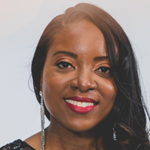 |
Senior Director, Global Impact Measurement Visa |
Private Sector and Multilaterals |
 |
Senior Program Officer Bill & Melinda Gates Foundation |
Philanthropy and Private Sector |
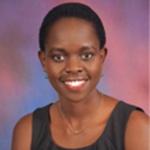 |
Senior Program Manager, Global SRH Clinton Health Access Initiative |
Sexual and Reproductive Health Policy, Implementation, and Measurement |
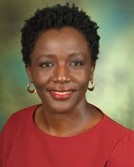 |
Africa Regional Director International Center for Research on Women (ICRW)- Africa Region |
Sexual and Reproductive Health and Rights |
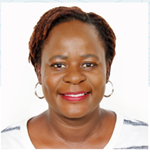 |
Faculty /Director Strathmore University |
Academia |
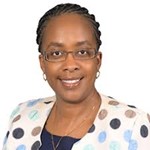 |
General Practitioner & Board Director with HHI B.V, E-Plus Kenya, and PATH (K) |
Physicians in Africa |
 |
Country Director Chemonics International |
Health Systems |
 |
Medical and Scientific Affairs Lead, Global Health Equity, Johnson & Johnson |
Vaccine Development and Private Sector |
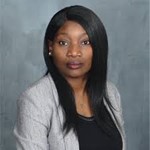 |
Director of Global Training and Implementation American Academy of Pediatrics |
Maternal Newborn and Child Health
|
 |
Senior Technical Advisor and Acting Head of Quality of Care, Population Services International (PSI) |
Sexual and Reproductive Health and Rights |
 |
Executive Director Reproductive Health Network Kenya |
Reproductive Health Systems and Policy |
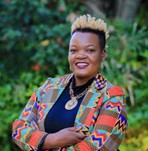 |
Assistant Professor University of Utah College of Nursing Director of Global and International Health (Interim)
|
Inclusion in Global Health: Global Nursing |
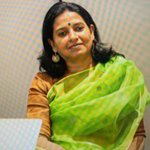 |
Chapter Development Consultant Asia-Pacific & Middle-East Women in Global Health |
Inclusion in Global Health: Disability Rights |
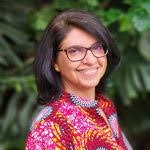 |
Senior Director, Girls & Women Strategy United Nations Foundation |
Gender Equality |
 |
Population and Global Health Research Director, Department of Emergency Medicine Stanford School of Medicine |
Clinician Scientists and NCD Research
|
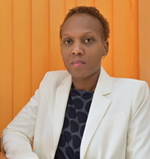 |
Chief Program Officer Girl Effect |
Social Behavior Change |
Panel: Policies that work
Despite growing public commitment to gender equality in the workplace – including in global health – there continues to be notably few women at the highest levels of leadership. Meaningfully changing existing power imbalances requires concrete actions within institutions, including policies and practices that create inclusive environments, respond to the unique sexual and reproductive health needs of women, address historic inequities around pay, and protect from gender discrimination and harassment. This panel will spotlight key leaders and organizations who have successfully implemented policies and practices to create more equitable workplaces and outline why women’s leadership is critical to institutional success.
Video Address:
Prof Krishnaswamy VijayRaghavan, DAE - Homi Bhabha Chair Professor, National Centre for Biological Sciences, Tata Institute of Fundamental Research
Moderator: Dr. Iris Mwanza, Deputy Director of Women in Leadership, Gender Equality Division, Bill & Melinda Gates Foundation
Speaker:
1. Dr. Rohini Anand, Founder and CEO, Rohini Anand LLC
2. Dr. Samukeliso Dube, Executive Director, FP 2030
3. Mr. Paul Kasimu, Chief Human Resources Officer, Safaricom PLC
4. Dr. Maliha Khan, Executive Director and CEO, Women Deliver
Spotlight Talk: Women Leaders Shaping Climate Action in Tanzania
This Spotlight Talk by Zuhura Ahmad, a Tanzanian climate activist, will draw on her personal experiences and highlight examples of the way women are leading innovative ventures to shape climate action in Tanzania.
Speaker: Zuhura Ahmad, Head of Programs, The Women in Recycling Foundation
Panel: Women’s Leadership and Health, Gender & Climate Change
In recent years, record-setting extreme heat, wildfires, floods, and disease outbreaks worsened by global warming have made clear how urgently action is needed to slow climate change and adapt to the related health impacts. This panel will spotlight issues at the nexus of climate, health and gender through the lens of women’s leadership, highlighting how women, especially indigenous women and women in the global south, are already leading frontline efforts to implement local solutions for adaptation and resilience. It will also delve into the role of women as leaders and active participants in decision-making and implementation, and explore how all people can collaborate to enable and scale the climate and health solutions our world so desperately needs.
Moderator: Dr. Yvonne Maingey-Muriuki, Founder and Technical Advisor, Panim Holdings
Speakers:
1. Dr. Debisi Araba, Public policy, innovation and strategy specialist
2. Sareen Malik, Executive Secretary, African Civil Society Network for Water and Sanitation (ANEW)
3. Dr. Soumya Swaminathan, Chairperson, M S Swaminathan Research Foundation (MSSRF)
Moving from monitoring to accountability: Upholding Rights & Commitments of Global Health 50/50
Led by Global Health 50/50.
For the past 7 years, GH5050 has annually published evidence on equality and diversity in the global health sector. Drawing on principles of accountability (i.e. independence and transparency) and rooted in human rights frames, we have examined issues ranging from Board diversity to organisational policies to realise sexual and reproductive health and rights across the (employee) lifecourse in 200 organisations that exist in the global health ecosystem. Data trends over time have shown that commitments to equality have increased, but positive changes across many outcome variables (e.g. equitable leadership) remain elusive.
Moderator:
Radhika Uppal, Technical Specialist - Gender & Development, International Center for Research on Women (ICRW), India
Speakers
1. Sarah Hawkes, Co-Founder and Co-CEO, Global Health 50/50
2. Sapna Kedia, Assistant Director, Gender and Social Development, International Center for Research on Women (ICRW), India
3. Dr.Sylvia Muyingo, Africa Population and Health Research Centre (APHRC), Kenya
Panel on Gender Equity and Inclusivity in LMIC Research Mentorship (LSHTM)
Led by: London School of Hygiene and Tropical Medicine.
This parallel session will bring together finalists from the crowdsourcing open call to present their mentorship ideas and an expert panel to discuss issues around equity, gender, and an intersectional perspective in research and in mentorship in LMICs, opportunities and challenges of women in science and strategies to advance more women leaders in global health.
Introduction and Overview
Dr Eneyi Kpokiri, PhD Clinical Pharmacist and Assistant Professor at the London School of Hygiene and Tropical Medicine
Speakers:
1. Ms. Hannah Berrian, Research Fellow for Patient Engagement and Person-Centered Approaches at Reducing the Burden of Severe Stigmatizing Skin Diseases (REDRESS), Liberia.
2. Dr Mrittika Barua, Assistant Professor and Deputy Director, Centre for Science of Implementation and Scale-up, BRAC James P Grant School of Public Health, BRAC University, Bangladesh
3. Ms. Annabel Steiner, Student, University of North Carolina at Chapel Hill
4. Dr. Bethelhem Solomon Woldetsadik, Associate Researcher , Armauer Hansen Research Institute
Panelists
1. Dr Mariam OTMANI DEL BARRIO, Scientist, gender and intersectionality research lead, The Special Programme on Research and Training in Tropical Diseases, WHO, Switzerland
2. Dr Ogechukwu B. ARIBODOR, Senior Lecturer, Nnamdi Azikiwe University, Awka, Nigeria
3. Dr. Agatha Eileen Wapmuk, Public Health Physician/Research Fellow, Nigerian Institute of Medical Research, Yaba, Lagos State, Nigeria
4. Dr. Phyllis Awor, Lecturer, Makerere University School of Public Health, Uganda
5. Dr Wessel van den Berg, Senior Advocacy Officer, Equimundo: Center for Masculinities and Social Justice
6. Prof Michele BARRY, Director of the Center for Innovation in Global Health, Senior Associate Dean for Global Health, Stanford University, United States.
The Power of Voice: Leadership Storytelling Workshop (GHC)
Led by: Global Health Corps.
This interactive workshop is designed to introduce participants to the concept of leadership storytelling -- the idea that stories can and should be used effectively and powerfully by leaders to motivate and inspire, galvanize, and deliver results. The workshop will help participants develop their capacity to craft and share their own personal narratives as a critical leadership skill. Particularly for women and other historically marginalized leaders in global health, this is a critical skill as it enables the connection between personal experiences and values, and cultivates the ability to mobilize movements. Whether you’ll give speeches to huge rooms of people or need to motivate small teams of colleagues, this is about pushing you slightly outside of your comfort zone, on a topic that you know better than anyone else: your authentic voice.
Facilitator: Brittany Cesarini, Senior Director of Communications & Development, Global Health CorpsElevating Women’s Leadership in Health Media Coverage
Led by: WomenLift Health.
Despite progress in gender equity and women's empowerment, there remains a significant gap in the representation of women leaders in health coverage by the media.The session will explore the “invisibility” of women in news coverage and focus on how journalists think about covering health stories, including those related to women’s leadership in the health sector. The session aims to provide a platform for journalists to share insights, identify gaps, and discuss challenges they face in highlighting the stories and voices of women leading in health. The session will also explore how best women leaders can become key opinion shapers in the news. By fostering dialogue and collaboration, we seek to address these challenges and work towards increasing the visibility and impact of women's leadership in health.
Moderator: Lizz Ntonjira, Communications and Engagement Director WomenLift Health
Speakers:
1. Dr Ellen Mkondya-Senkoro, CEO at Benjamin W. Mkapa Foundation
2. Dorcas Odumbe, Gender & Education Editor, Kenya's Nation Media Group
3. Alex Jakana, Senior Program Officer Philanthropic Partnerships, Bill & Melinda Gates Foundation
4. Mr Abraham Mariita, Project Director, Internews
[Workshop] Disrupting Harmful Narratives: Gender Transformative Leadership Skills
Led by: John Hopkins University.
Organizations perpetuate harmful narratives which disproportionately disadvantage women. Disrupting harmful narratives is gender transformational. These narratives include:
· Emotions should be separated from work.
· Conflict is negative and we should avoid it.
· You must negotiate.
· You must be authentically a woman or authentically a leader – but you cannot be both.
· You have imposter syndrome.
Gender-responsive, transformative leadership strives to mainstream gender into the “process of assessing the implications for women and men of any planned action, in all areas and at all levels”. It’s not just about achieving gender equality, but also about equipping women and men with the tools to change the narrative and challenge and change inequitable systems and structures.
This workshop seeks to address these harmful narratives and asks participants to consider alternatives which they can incorporate into their own leadership, now. Since women’s leadership initiatives shouldn’t be about ‘fixing women’ but rather ‘transforming harmful systems’ - we start this workshop there. We aren’t equipping women with skills to help them conform, but rather, to dismantle oppressive organizational systems. The approach will also provide for context-specific lenses. Participants will first be asked to assess what isn’t working for them, in their context, in their organizations. Not everything is equally transformative (or feasible) in every space.
While all conference participants are welcome, this session might be particularly useful for emerging women leaders and male allies.
The workshop will include brief presentations and practical demonstrations. Participants will break into groups of two or three to role play, practice, and apply new strategies to different narratives. The session will conclude with a reflection period, providing space for participants to share their experiences and insights, and brainstorm ways to integrate new ideas into their leadership moving forward.
Facilitators
1. Dr. Anna Kalbarczyk, Associate Scientist, Johns Hopkins Bloomberg School of Public Health
2. Dr. Rosemary Morgan, Johns Hopkins Bloomberg School of Public Health
3. Dr. Mehr Manzoor, Founder & CEO, BeyondParity; DEIA Consultant, EnCompass LLC
4. Dr Choolwe Nkwemu Jacobs, Country Lead - Women in Global Health Zambia
5. Meagan Harrison, Research Associate II, Johns Hopkins Center for Global Health
Women on the Frontlines: An Undervalued and Unprotected Workforce
Led by: WomenLift Health.
Women are the backbone of every successful health workforce and health initiative. They make up 70% of the global workforce and 90% of frontline healthcare workers (HCWs), yet they are overburdened, underpaid, unsupported and unprotected in the workplace. According to the Community Health Impact Coalition, 50% community frontline workers in LMICs, and 86% in Africa, are not salaried. Country policies and frameworks on the incentive-based or volunteer labor of frontline workers are compounded by donor-funded primary care programs that support delivering healthcare through unpaid labor as an acceptable mechanism to enable access to care and achieve universal healthcare coverage, thus perpetuating forms of structural violence. In most LMIC’s there is no legal/policy framework specifically designed to protect frontline health workers. The leadership and power structures frontline HCWs report to are still predominantly male. According to the #HealthToo report by Women in Global Health, which analyzed women’s stories from 40 countries, women face blatant harassment and assault in the workplace. Failing to value, promote, pay or protect frontline workers impacts retention and quality of service delivery and ultimately negatively impacts the health system.
This panel brings together Alumnae from the Leadership Journey and women working on the issues of the frontline women workforce. The session will outline the current state of women on the frontlines in low-resource countries, with particular emphasis on Asia and Sub-Saharan Africa’s community health workforce. We will discuss the critical need to build leadership among women while simultaneously working to shift gender-based social perceptions and power dynamics and address issues of pay and protection. Panelists will share specific country examples which have been undertaken to understand and address these inequities, discuss challenges, and opportunities for donors, advocacy groups, and ministries of health to support a shift to a more empowered, safe, and fairly paid frontline workforce.
Moderator: Ms. Lanice C. Williams, Independent Consultant; Chair, Women in Global Health Washington, DC Chapter
Panelists
1. Samara Andrade - Vice President, Program Strategy and Partnerships, HCP CureBlindness/SightLife international
2. Dr. Sanjana Mohan, Director, Basic Healthcare Services
3. Dr. Choolwe Jacobs, Lead for Women in Global Health Zambia Chapter
4. Dr. Priya Nanda, Independent Consultant, Gender, SRHR, and Women’s Economic Empowerment
Propelling Women to Power and Influence: The Most Impactful Data and Interventions for Change
Led by: BMGF & Boston Consulting Group.
The session will aim to dissect the gender equity gap in health organizations by presenting data-driven insights, discussing high-impact interventions, and sharing a real-world example of effective implementation. The 90-minute session will feature experts from Global Health 50/50, MP Shah Hospital and the Boston Consulting Group among others.
Speakers
1. Dr. Joan Osoro-Mbui, Chief Operations Officer, MP Shah Hospital
2. Sarah Hawkes,Co-Founder & Co-CEO, Global Health 50/50
3. Ida Norheim Hatgun,Senior Program Officer - Gender Equality, Bill & Melinda Gates Foundation
4. Angela Ahadome, Principal, Boston Consulting Group
5. Sarah Chamberlain, Managing Director & Partner, Boston Consulting Group
Reimagining Leadership in Global Health: What’s Power got to do with it?
Led by: WomenLift Health.
Globally, the emerging discourse on women’s leadership is around redefining narratives and cultures of power grounded in equality and justice. Power has often been considered as a binary, masculine, often synonymous with men in opposition to those who don't hold it, largely women. On the contrary power is not a binary; in fact, it is multi-layered and complex. Incorporated within power are ideas of access to money, people, spaces, and information. Discussions of reimagining leadership in the context of power prompts us to think about the complexity of redistributing power and creating more dissonance in who has access and under what conditions.
This session will convene leaders from organizations that have been walking the talk- of shifting power and creating models of shared leadership with a vision to democratize and achieve higher and sustainable impact. We believe the conversation of reimagining leadership needs to be pegged to important discussions around redistributing power. We want to bring an honest conversation about what it takes to shift power to reimagine leadership as we know it, between those who have reimagined leadership and practiced it in their institutions and participants at the WLH Conference.
The panel will explore these questions: How are organizations restructuring and redistributing assets and opportunities to develop shared leadership models? What does it mean to identify meaningful, contextual objectives for reimagining leadership, and have they been able to allocate resources to achieve these objectives? What are some of the expected outcomes of the process of shifting power, and how effectively are these achieved? What is the role of traditional “HQs” in localization processes? What does localization mean to the diverse stakeholders who are experiencing the change? How do roles and relationships change? What are some of the reflections of this process amongst those who have tried to shift power?
Panelists
1. Ms. Benter Owour: IPAS Global Network Advisor, Uganda
2. Gunjan Veda, Global Secretary, The Movement for Community-led Development, USA
3. Ms. Joanna Mbakulo: Uganda Country Coordinator, Movement for Community Led Development (MCLD), Uganda
4. Ms. Evelyne Opondo, Director, ICRW Africa, Kenya
5. Dr. Norah Obudho, East Africa Director, WomenLift Health, Kenya
Curators
1. Sia Nowrojee, Senior Director, Girls & Women Strategy, United Nations Foundation, USA/KENYA, WLH NA 2020
2. Dr Nandini Oomman, CEO, Samya Ventures, USA/INDIA WLH NA 2020
3. Dr Priya Nanda: Global Health Research and Evaluation Specialist, INDIA, WLH INDIA 2021
Panel on Male Allyship: What do men have to do with it?
On the pathway to reimagining leadership, people of all genders will need to be engaged. In the global health field, where women make up only a quarter of leadership despite making up 70 percent of the workforce, men must be active players in generating systemic changes to correct this imbalance. This panel will bring together a small group of male allies who are each playing a role in advancing gender equality in global health. Together, speakers will explore the importance of allyship and provide insight into how to foster allyship at the individual and institutional levels.
Audience Interactive Session on Allyship
In this interactive segment, the MC will lead an engaging session for the delegates on what allyship means to them and how they have experience allyship in its wholesome facets including peer-peer allyship, senior women supporting younger women among others. The session will also explore barriers experienced and how to navigate through them.
Authentic Leadership: Lead from your Values
Led by: WomenLift Health.
Discover the power of authenticity in leadership through a highly participatory workshop. Engage in self-reflection, intimate dialogue with small groups, and bring your reflections back to the plenary to explore what authenticity really means to you and how you might bring more of yourself into your leadership.
This session is designed to enhance emotional intelligence and support the mindset shift needed to solve systemic challenges faced by leaders in today’s complex and diverse environments. The purpose of this workshop is not to “fix” you; rather, to create a safe and brave space where you can identify the core values that anchor, motivate, and guide your authentic leadership
Conflict Dynamics: Build Better Relationships
Led by: WomenLift Health.
Conflict is inevitable, unavoidable, complex, and can be mentally, emotionally, and physically draining, and difficult to navigate. Conflict can also negatively impact personal progress and goals, team dynamics, and workplace culture. Research shows that women in particular tend to avoid disagreement, corresponding to socially constructed norms of femininity.
Conflict can also serve a purpose. It can generate new solutions, build better relationships, and can increase job satisfaction. It is key to innovation and can be a critical component of risk mitigation. Conflict follows a predictable pathway and will diverge to become either constructive or destructive. The question for this workshop is: How do we navigate the path of conflict so that it is constructive, and we can walk away feeling positive, relaxed, and even motivated?
In this session, for beginners and seasoned practitioners alike, we will explore the Conflict Dynamics Model by unpacking the behaviors and actions that influence interpersonal conflict. Attendees will reflect on and map out a recent work disagreement by focusing on the active, passive, constructive and destructive response pathways. We will understand how to identify our own “hot buttons” and contributions to either escalating or de-escalating a conflict.
Allyship in Action: Driving Women's Leadership Collectively
Led By: John Hopkins University.
An emerging body of evidence suggests that allies, particularly male allies, have a crucial role in dismantling systems that perpetuate disadvantage towards women leaders. A recent national study conducted by Promundo found that “most men want to be allies for gender equality, and many think they already are – but women aren’t convinced. It’s time for men to close this ‘allyship’ gap and move from intention to thoughtful action”. Women can also support each other through allyship, though men are more often in positions of power and privilege.
While allyship is increasingly promoted as a tool to support diversity, equity, and inclusion in the workplace, there is limited guidance on what allyship looks like specifically for advancing women’s leadership globally, and how to foster it within our organizations. Most current advice on the topic is vague at best, and unhelpful or frustrating at worst. Harvard Business Review suggests “taking the temperature”, and “look for patterns” as ways to identify male allies; Deloitte suggests allies should “lead with courage and compassion”. This type of advice can leave allies wondering what they can really do to advance women’s leadership.
This workshop seeks to share and generate tangible and applicable approaches to fostering allyship for women’s leadership in global health. We will do this by exploring organizational entry points where allyship can impact women’s leadership and brainstorming strategies in small groups. Entry points for allyship will be defined as enabling/enhancing organizational factors for women’s leadership. Allyship can and should occur at multiple levels: interpersonal (e.g., mentorship, sponsorship), public (e.g., sponsoring women in public, calling out if a woman was interrupted in a meeting), and systemic (e.g., equal pay, equitable workplace policies).
Navigating Workplace Politics
Led by: WomenLift Health.
Developing political competence is an essential leadership skill. Being politically savvy or skilled informs our ability to leverage our influence to advance our own goals, as well as those of our teams and our organizations. The nature and intensity of workplace politics differs in each context. These politics are dynamic, explicit and implicit, and fundamental to the functioning of organizations. What are politics like in your context?
The negativity often associated with organizational politics creates hurdles to our ability and willingness to embrace them. The fact is that politics are natural. It would be naïve to deny that organizational politics can be potentially destructive, yet when leveraged strategically and effectively they advance our leadership efforts.
This session will help you reflect on and potentially reframe your relationship with organizational politics. The objectives of this session are to unpack what organizational politics actually are, to acknowledge that they can be burdensome, to recognize their value, and develop your ability to navigate them. Develop and refine politically savvy mindsets and skillsets which will enable you to navigate relationships more naturally and effectively. Join us to explore your political savviness and assess the political landscape in which you lead.
Addressing Gender Bias in the Workplace
Led by: WomenLift Health.
Every society possesses beliefs around the roles that men and women should take in our families, communities, and workplaces. These are called gender roles, and they are a social construct, meaning they are neither discussed openly, challenged, nor objectively true. These beliefs, taught through our families, schools, media, and cultures, are transmitted from generation to generation. Gender roles become accepted as the “regular” or “normal” ways we treat men and women differently.
It’s a short step from here to stereotypes, reinforced throughout our lives, which create opportunities for some and obstacles for others. These obstacles hold back not only women and men, but entire societies. In many countries around the world, development has suffered as a significant portion of the population is excluded from active participation in the workforce or from realizing their full potential. This is not a zero-sum game: closing the gender gap between men and women’s access to education, political voice, employment opportunities, and pay equity could give the global economy a USD 7 trillion boost (UN Women).
In this interactive workshop we use small group discussions, individual reflections, and a case study to unpack the concept of gender, unearth stereotypes that create obstacles for women’s advancement at work and at home, and identify practices to enhance organizational culture for women and men alike. Whether gender bias is a new concept for you, or you’re looking for some activities to bring back to people in your organization who need to understand gender bias better, this workshop is for you.
Overcome Imposter Syndrome
Led by: WomenLift Health.
The public and global health workforce is facing a leadership crisis—while women make up 75 percent of the public health workforce they occupy only 25 percent of senior leadership positions. WomenLift Health’s research finds various structural barriers behind this gender gap, including a lack of mentorship, the demands of balancing work and family life, and traditionally patriarchal work cultures which reinforce a systemic lack of self-confidence among women.
Imposter syndrome—commonly defined as a sense of being undeserving of one’s accomplishments or position—often manifests as a lack of confidence and a fear of being “found out” as a fraud. This is a very common experience for women, who often wait for others to see their potential and tend to undersell their contributions relative to their male counterparts. Imposter syndrome, however, is not an innate feeling that women are born with, recent publications argue. It is often the result of facing repeated exclusion and systemic bias.
While there is a need to collectively hold systems accountable, those who experience imposter syndrome also need strategies to counter it. In this interactive session, you will explore how imposter syndrome manifests in thoughts and work behaviors, reflect on your professional experiences and stories, and find key takeaways to lead with more confidence and impact.
AI and Global Health: A workshop for Leaders Driving Change
AI has the potential to improve health outcomes, enhance health systems, and address health inequities. Its integration into Global Health presents opportunities to improve disease diagnosis, treatment, and surveillance.
However, AI also poses significant challenges and risks, such as ethical, legal, social, and technical issues, that need to be carefully considered and addressed by health leaders.
Global health leaders, who are responsible for setting health policies, strategies, and priorities at the programmatic, regional and global levels, need to have an understanding of AI and its implications for health.
By the end of the workshop, the participants are expected to:
- Define AI and its subfields, and how they relate to health.
- Describe current initiatives and AI for health activities in the global health space.
- Explain some of the current and emerging use cases of AI for health, and their benefits and limitations.
- Summarize issues specific to gender and data and other key challenges and risks of AI for health, and how to address them.
- Articulate some of the best practices and principles for ensuring that AI for health is responsible, ethical, and human-centered.
- Communicate and collaborate with various stakeholders on AI for health issues and initiatives.
The workshop will be facilitated by a team of experts from various disciplines and backgrounds, such as AI, digital health, ethics, policy, and education. The facilitators will provide relevant and up-to-date information, insights, and guidance on AI for health, and will also encourage active participation and feedback aligned with feminist pedagogies.
Foster Belonging, Lead Inclusively
Led by: WomenLift Health.
There is a well-known quote by Verna Myers which says, “Diversity is being invited to the party, Inclusion is being asked to dance.” Individuals from marginalized groups, for example women or people with disabilities, don’t feel like they belong even when they’re included. How might leaders create environments that foster belonging? How might we lead inclusively?
We begin by exploring the many aspects of our identities which impact how we show up and how we are perceived in the workplace. We relate our personal experiences of exclusion and inclusion. Then, we connect the dots and discover the misalignment between our intention and our impact. Our words, actions, and often our inaction, are all drivers of inclusion and exclusion. This session is one of many steps to recognizing the power of fostering inclusion and belonging, not only for an individual leader, but for an organization as a whole.
